NE corner of Wellington & Balfour Streets. Google maps.
Home to what seems to have been Launceston’s first theatre (1834, more about the theatre here). Became the colonial hospital in the early 1840s, and then the public Cornwall Hospital until the construction of the Launceston General Hospital in 1863.
1832 Alexander Rose, British Hotel, Wellington Street
1833 Henry Davis, British Hotel, Wellington Street
1834 Thomas Massey, British Hotel, Wellington Street
1835-36 John Hamilton Jacobs, British Hotel, Wellington Street
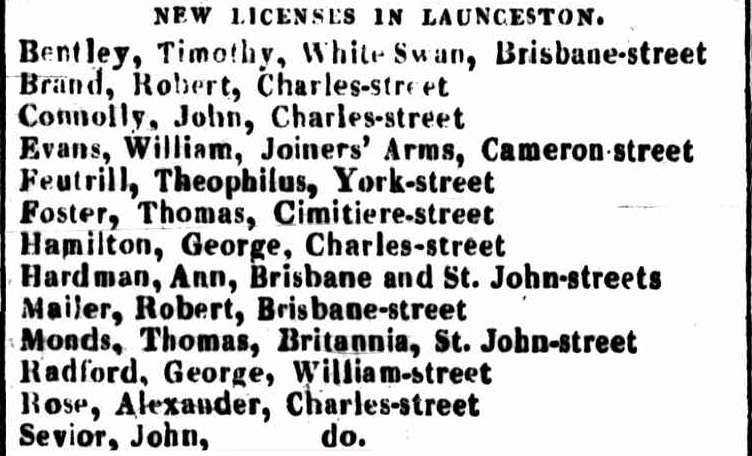
Launceston Advertiser, 28 September 1831
Although this says Charles St, the license is granted for the following year (1832) and Rose is signing himself as the proprietor of the British Hotel, Wellington Street in May 1832 (see first ad below (not sure it does indicate a Wellington St address)).

Launceston Advertiser, 9 May 1832
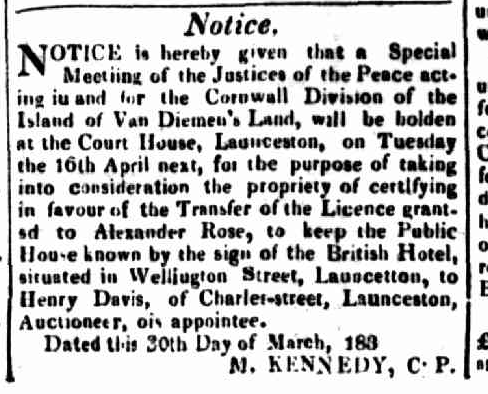
The Independent, 6 April 1833
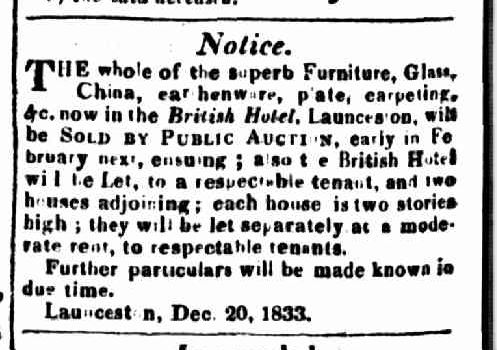
The Independent, 28 December 1833

Colonial Times, 4 February 1834
The Bachelor’s Ball is fixed for the 8th inst.— it will take place at the Assembly Rooms of Mr. Thomas Massey at the British Hotel, in Wellington Street, and is expected to be numerously attended.
The Independent, 3 May 1834

Launceston Advertiser, 19 May 1834
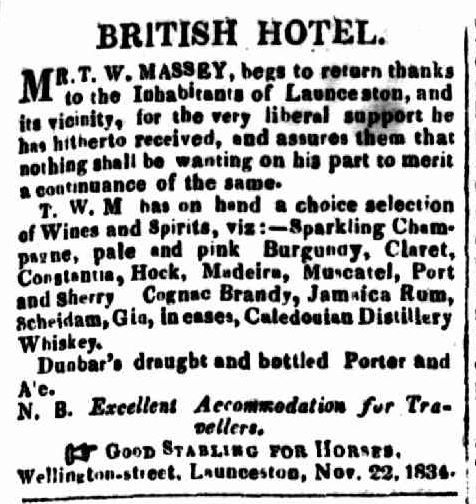
The Independent, 22 November 1834
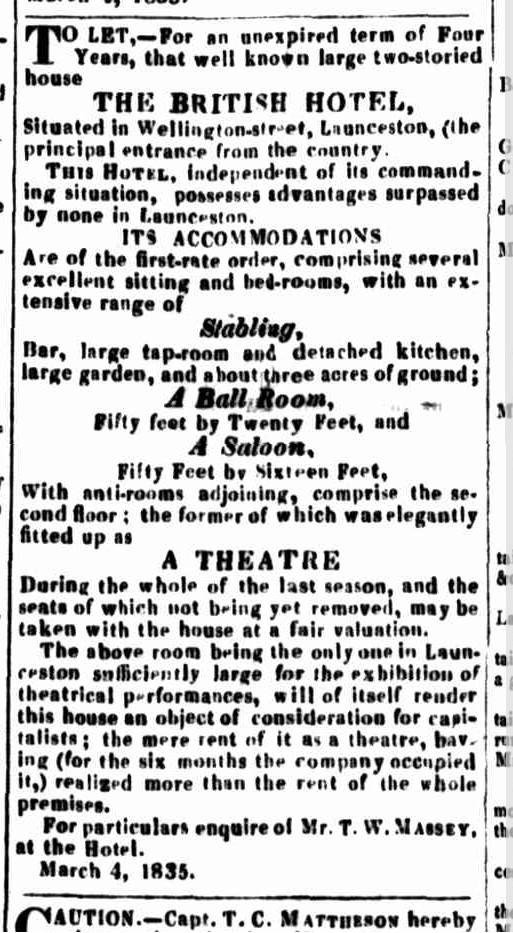
Launceston Advertiser, 5 March 1835
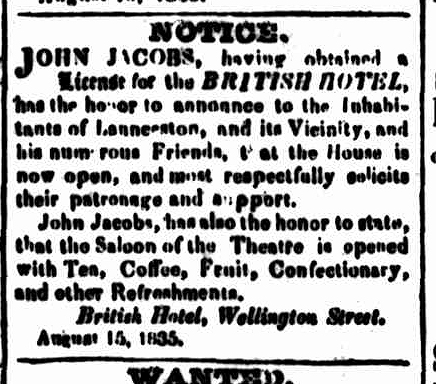
Colonial Times, 15 August 1835

Cornwall Chronicle, 5 March 1836
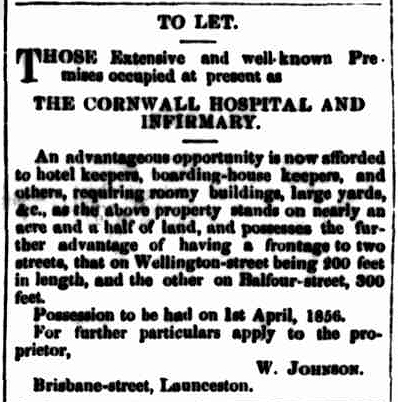
Launceston Examiner, 27 October 1855
Messrs Hudson and Sherwin report the sale by private contract of the property in Wellington street, known as the old Cornwall Hospital, to Mr Henry Reed, Mount Pleasant, for £1000 cash.
The Tasmanian, 15 September 1877
Town Improvements.-— The fine block of two-storey brick and cement residences that now occupy the angle of Wellington and Balfour-streets, where but a few years ago stood the old hospital and several ancient weatherboard tenements, are now approaching completion, and are a decided ornament to that part of the town. It will be remembered that these buildings were projected by Mr. Henry Reed some time prior to his death, and have been completed by Mrs. Henry Reed in accordance with the original design. In Balfour-street the residences, known as Dunorlan Cottages, comprise three villas of 11 rooms each, two of which are let to tenants, and one occupied by tho pastor of the Mission Church, Mr. Hiddlestone, and three houses of eight rooms each intended as homes for aged and infirm persons. Married couples are allowed two rooms, and single persons one room ; a rent of 6d per week being paid, whether for one or two rooms, and those who can work are encouraged to do so, the idea being to assist those who are willing to help themselves, and not to encourage idleness and a spirit of pauperism. Two of the three cottages are occupied. by deserving poor persons, there being six in each, and the selection is not restricted to members of the Mission Church congregation, three denominations being represented. Of these persons some receive aid from Mrs. Reed, and some from the Benevolent Society or from the Mission Church, but none are in any way a burden on the Government as recipients of charitable allowance. The third cottage is temporarily let to a tenant, but if further cases for relief occur it will be given up to them. The row of houses in Wellington street, known as Dunorlan Terrace, comprises fourteen five-roomed houses, well fitted with conveniences, which are let as fast as completed to respectable tenants at a moderate rental, and the competition to secure them is pretty keen. All except the two or three houses in the centre of the terrace are completed and occupied, and the workmen are finishing off the remainder.
The Tasmanian, 31 May 1884
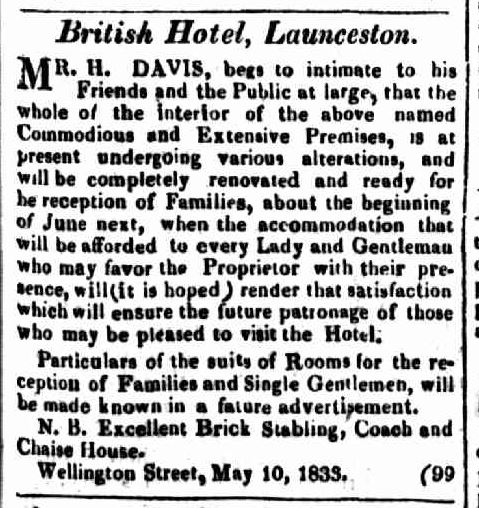
Another hotel on the corner of Wellington and Elizabeth St was the Freemasons Tavern, ‘previous the Commercial Warehouse but now to be known as the Freemasons Tavern’ 09/34 JB Harwood (a mariner who later advertised the licence for lease as he had been called away on urgent business 05/35).
He was subsequently master of the Rebecca which took Batman to Pt Philip district when the treaty was signed and the area was to become Melbourne .
Thanks for that. I’ll add it to my notes. (For some reason I’m not getting notifications of comments for tihs blog.)